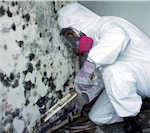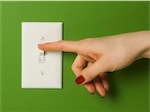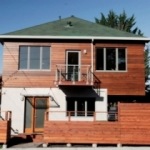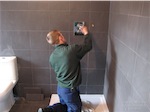Energy efficient appliances can offer energy and money savings. While it may not be economical to replace a piece of appliance, when the appliance is reaching the end of useful life or when new appliances are purchased during a remodel, choosing an energy efficient model is the perfect time. The energy efficient model may cost a little more than other models, but the payback can be realized very quickly.
The Energy Star Label certifies that the appliances meet the EPA energy usage standard. Energy Star product performance is tested by EPA-recognized laboratories or certification bodies. Energy Star has developed to forumulae to measure product effectiveness. The first is the Modified Energy Factor (MEF) which measures energy efficiency and the other is the Water Factor (WF) which measures water usage efficiency. A higher MEF means better energy efficiency and a lower WF means better water efficiency. Energy Star has also set minimum MEF and WF standards for each type of product. The MEF and WF are shown on the Energy Star Label.
There is yet another energy efficiency certification provided by the Consortium for Energy Efficiency (CEE). The CEE classifies products into tiers that perform better than the Energy Star standard. The CEE certification is not available as a label on products but the information can be easily found at the CEE website.
In addition to recurrent energy savings, some Energy Star and CEE certified products may qualify for rebates from State or local agencies. The Energy Star label itself does not guarantee a rebate. To check if a product qualifies, it is important to note the model number and check against the rebate list from the rebate agencies. The Energy Star and CEE standards are evolving targets. Older products may still carry a Energy Star label based on the standard of that year, but may not be eligible for rebate because of a newer standard is already adopted.
The Right Appliance
Choosing appliances has to, first and foremost, fit your life style. They should have the right set of functions and feature and have to operate in ways to fit your usage needs. Check recommendations and comments from reputed sources (example are listed at the bottom of this page) about models you are interested in. From the energy efficiency perpective, here are some tips for the common appliances.
Refrigerator
Top-freezer models can be 15% more energy efficient than size-by-side models, with bottom-freezers slightly below the top-freezer models. The technical reason is that there is less outside surface areas around the freezer section. Ice and water dispensers add to energy usage as the dispensing openings are typically not as well insulated.
Old refrigerators should be recycled and not left in the garage. Running an old refrigeration in the garage in a hot summer day is most taxing in energy and cost. Not only is the old refrigerator an inefficient machine to begin with, it has to overcome the hot temperature. On top of that, many utility rates are highest during the hot summer afternoons.
Gas Cooktop vs Electric Cooktop
Many people prefer gas cooktops because it is easy to control the amount of heat instantly. This is a very valid point and is a matter of cooking style. As far as energy is is concerned, gas cooktops are generally only 35% efficient, which means only 35% of the heat is applied to the pot or pan and 65% is lost to the surroundings. Electric cooktops are 70% efficient. The new electric induction cooktops are 85% efficient but they require cooking utensils that contain sufficient amount of magnetic material.
Another consideration is energy cost. Utility companies typically charge less for gas than electricity for a unit of energy delivered. (Both gas and electricity energy measurements can be converted to the same unit such as a BTU, which is a unit for heat). However, liquified natural gas cost depends on the location and solar electricity costs will depend on the installation, so these two must be considered on a case by case basis.







